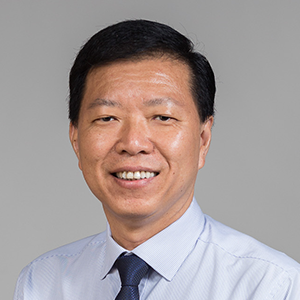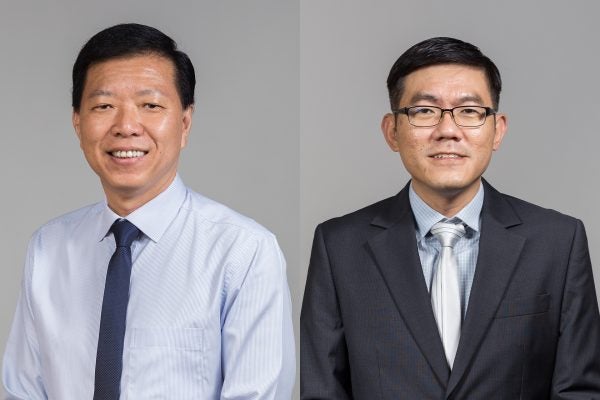
TEO Hock Hai
Provost's Chair ProfessorDirector (Humanities & Social Sciences Research), NUS Office of the Deputy President
- Ph.D. (Information Systems, National University of Singapore)
- M.Sc. (Computer & Information Sciences, National University of Singapore)
- B.Sc. (Computer & Information Sciences, Honours, National University of Singapore)
Hock-Hai Teo is Provost's Chair Professor of Information Systems. He served as the Head of the Department of Information Systems at the School of Computing, National University of Singapore from August 2008 to June 2015 and as Vice-Dean, Corporate Communications from August 2007 to August 2008. His current research interests focus mainly on Health Informatics, open innovation, and IT artifacts that are geared towards improving individual decision-making, health outcomes and educational outcomes. Dr. Teo has published broadly in journals such as the ACM Transactions on Computer-Human Interactions, MIS Quarterly, Journal of Management Information Systems,Information Systems Research, IEEE Transactions on Engineering Management,International Journal of Human-Computer Studies, and Information and Management and has presented at numerous international conferences,including the International Conference on Information Systems. He is currently serving or has served on the editorial boards of Data Base for Advances in Information Systems, European Journal of Information Systems, International Journal of Electronic Commerce, Information Systems Research, IEEE Transactions on Engineering Management and MIS Quarterly. He has won numerous best paper award at conferences and was also the winner of the MIS Quarterly Reviewer of the Year (2004) award.
RESEARCH INTERESTS
Health Informatics
Innovation Assimilation
IT Artifacts and Information Processing
Information Technology Adoption
Open Innovation
Design and Implementation of IT artifacts
Electronic Markets
Virtual Community
Information privacy
RESEARCH PROJECTS

Multilingual Acoustic Predictors of Dementia in Singapore: A Machine Learning Approach
This research focuses on developing the Cognify tool for early dementia detection using acoustic features from voice recordings. It aims to create a culturally sensitive model incorporating Singlish, Malay, and Chinese language, addressing linguistic gaps in existing Western-centric studies. The goal is to improve non-invasive, early dementia prediction in Singapore.

QuitTogether: A Technology-Based "Narrative Therapist" for Smoking Cessation
QuitTogether addresses the global health burden of smoking-related health issues. It recognizes differing views on agency in addiction treatment and uses Narrative Therapy techniques to enable smokers to construct healthier life stories, aiding in quitting smoking.

EMPOWERing Patients with Type 2 Diabetes Mellitus (T2DM) in Primary Care through App-based Motivational Interviewing
Enhancing diabetes management involves a mobile app-based approach. By combining motivational interviewing (MI) and AI-powered nudges, we empower behavior change and shared decision-making in patients with type 2 diabetes mellitus (T2DM).

AI Over-reliance in Education
The project investigates whether ChatGPT fosters student over-reliance, potentially impacting learning outcomes. Its goal is to comprehend AI's influence and propose effective integration strategies in education.

Implementation of Empowering Diabetic Patients
Enhancing diabetes care through EMPOWER app upgrades, integrating wearables, expanding food database, AI health coaching, and continuous glucose monitoring for select participants.

Employee Wellness
Developing a fatigue prediction system for Singapore Airlines (SIA) crews, coupled with napping and scheduling strategies. These initiatives, along with a digital data platform, could save S$16 million and cut standby needs by 25%.
SELECTED PUBLICATIONS
- Lin, J, Wei, K.K, Teo, H.H, and Chan, H.C. “Comparing Competing Systems: An Extension of Information Systems Continuance Model,” 2016, Conditionally Accepted,MIS Quarterly.
- Tong. Y, Tan, C.H., and Teo, H.H. “Direct and Indirect Information System Use: A Multi-Method Exploration of Social Power Antecedents in Healthcare,” 2016, Conditionally Accepted,Information Systems Research.
- Kankanhalli, A., Ye, H., and Teo, H. H. "Comparing Potential and Actual Innovators: An Empirical Study of Mobile Data Services Innovation", Volume 39, No. 3, 2015,MIS Quarterly, pp. 667-682
- Tong. Y., Tan, S.S.L. and Teo, H.H., “The Road to Early Success: Impact of System Use in the Swift Response Phase,” Volume 26, No. 2, 2015,Information Systems Research, pp. 418-436 Meritorious Mention Award 2016 by Association of Information Systems SIG-Health
- Wei, K.K., Teo, H.H., Chan, H.C. and Tan, B.C.Y. "Conceptualizing and Testing a Social Cognitive Model of Digital Divide," Volume 22, Number 1, 2011,Information Systems Research, pp.170-187.
- Xu, H., Teo, H. H., Tan, B.C.Y., and Agarwal, R. "The Role of Push-Pull Technology in Privacy Calculus: The Case of Location-Based Services," Volume 26, Number 3, 2010,Journal of Management Information Systems, pp. 137-176.
- Tan, C.H., Teo, H. H., and Benbasat, I. "Assessing Screening and Evaluation Decision Support Systems: A Resource Matching Perspective," Volume 21, Number 2, 2010,Information Systems Research, pp. 305-326.
- Chan, H.C. and Teo, H.H. "Evaluating the Boundary Conditions of the Technology Acceptance Model: An Exploratory Investigation,"ACM Transactions on Computer-Human Interaction, Volume 14, Number 2, 2007, Article 9.
- Hui, K.L., Teo, H.H. and Lee, T.S.Y. "The Value of Privacy Assurance: An Exploratory Field Experiment,"MIS Quarterly, Volume 31, Number 1, 2007, pp. 19-33.
- Teo, H.H., Wei, K.K., and Benbasat, I. "Predicting Intention to Adopt Interorganizational Linkages: An Institutional Perspective,"MIS Quarterly, 2003, Volume 27, Number 1, pp. 1-31.
- Teo, H. H., Tan, B.C.Y., and Wei, K.K. "Organizational Transformation using Electronic Data Interchange: The Case of TradeNet in Singapore,"Journal of Management Information Systems, 1997, Volume 13, Number 4, pp. 139-165
COURSES TAUGHT





